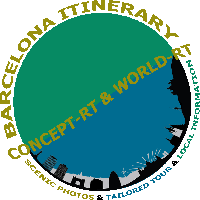The defects of a commercial travel guidebook
Sometimes we may wonder the difference between a local travel guide book and a commercial one or simply, which one to choose when we have to buy one. Of course, the easier way is to have both but would you spend money for 2 guidebooks for the same topic ??? Let’s take an example, on my weblog, you can download free my Barcelona travel book, on the other hand, there is also a paying complete version, both in pdf format, which means an ebook (electronic version) and not the traditional hard cover book. So let’s compare with my paid version and a book that you can buy in a shop. |
|
First, you have to print it, something that you don’t have to do with a normal book but do you really need it in paper ??? You can open it with a kindle, ipad… for example my cell phone can open pdf format and I’m sure that yours too. For me, this solution is more practical because I don’t need to walk with a book and because my cell phone is always with me. On the other hand, if you really really really want it in paper, just print it.
Secondly, the most important, the information. It is not the same thing a city book written by a local guy who lives in Barcelona and sharing his experience and favorite places than someone doing it from his office or who comes once a year to write about his subject. And thirdly, the price is cheapest in ebook version than a physical book. Below, the best defects of a commercial travel guidebook:
- Not up to date. Majority of them don’t have the information updated, things can change quickly due to a lot of reasons, for example an earthquake, a storm… even shops and restaurants can be closed because they went bankrupt. According to Peggy Goldman, president of Friendly Planet Travel, “much of the information covered by guidebooks changes too fast for book publishers to keep up, never rely on a guidebook for key information because those facts can change rapidly”.
- Incomplete information. Guidebooks are limited in space so Ensley Eikenburg, the associate publisher of Frommer’s travel guides said “it’s true that space is limited, so if something isn’t in the book, there may be a reason”. Thomas Kohnstamm, a former Lonely Planet guidebook writer, said “there’s simply not space in most guidebooks to include negative reviews so a hotel or restaurant that isn’t in the book might not have made the cut for a reason”. In general, a commercial travel book is written to sell a dream not information.
- No travel. Majority of writers don’t travel to the city to write or to update the information and some publishers don’t ask how writers are getting their information. According to Thomas Kohnstamm, “it’s called a desk update. Writers use the phone, the Internet, stories from other travelers and even old-fashioned books to research a destination, but they never actually go there. The practice is common throughout the travel industry”.
- Feedback from travelers. All facts are the responsibility of the writers meaning that publishers don’t check them so since many writers work in his office, they wait that readers (so us) to point out errors or out-of-date information. For example, Lonely Planet and Frommer’s say that fact-checking is the writer’s responsibility.
- Expensive prices. A place referenced by a famous commercial guide book may increase its prices so for instance, hotels and restaurants recommended by them tend to cost 25% or 30% more so better to find an alternative if we don’t want to fall into a tourist trap.
- Commercial travel book is also a tourist. According to some experimented travelers, guidebooks can’t be trusted for insider tips, for example about what the locals eat, their behavior in their normal life or their cultural norms.
- The law of demand. Books about popular destinations regulate the market so the ones, which have the most demand, have a better treatment. Thomas Kohnstamm said “the rest get sort of short shrift” and Ensley Eikenburg said “if one of our customers buys our guide to Panama and it’s not accurate, then we’ve lost that customer to the competition when they go out and buy an Italy guide or an Alaska guide”. Basically, it is our fault if we go somewhere not famous and if we decide to buy the guidebook in question.
One of the best advices is to check on internet before to do something and to be careful of some advices in some guidebooks. For example, Brian King, publisher of guidebooks for the Appalachian Trail Conservancy, said “they frequently hear complaints from less-experienced hikers who feel the books make scrambling over boulders sound like an easy day’s stroll”.
Even my guidebook can contain some errors for example the opening hours of a shop but I can detect it quickly and update my ebook immediately, it is the advantage to live in Barcelona. So when you plan to travel and looking for a travel book, you have to choose well between a local guide book and a commercial guide book (take both if you can get them free :-)


